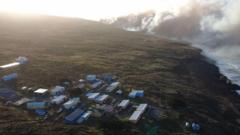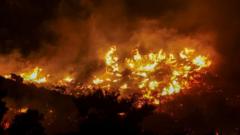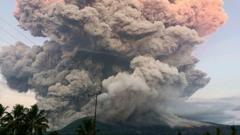With no permanent residents, the scientific mission on the island has been disrupted as authorities work to assess and control the wildfire's damage.
Wildfire Engulfs Half of Amsterdam Island: A Remote French Territory Struggles to Contain the Blaze

Wildfire Engulfs Half of Amsterdam Island: A Remote French Territory Struggles to Contain the Blaze
Severe wildfires have ravaged over 55% of the uninhabited Amsterdam Island in the Indian Ocean, raising concerns for the area's unique wildlife and ongoing research.
For nearly four weeks, Amsterdam Island, a French territory in the southern Indian Ocean, has been devastated by wildfires, consuming more than 55% of its 54 square kilometers. The island, situated between Australia, Antarctica, and Madagascar, is devoid of a permanent population but has hosted researchers since the 1980s. Following the outbreak of fires, 31 scientists were evacuated to Réunion Island, which is closer to Madagascar, while French officials initiated a mission to control the flames and assess their ramifications.
The blaze is believed to have erupted near an observatory that monitors atmospheric conditions and greenhouse gases. First spotted on January 15, the fire's origins are traced back to Pointe Bénédicte observatory. Reports from the Laboratory for Climate and Environmental Sciences (LCES) indicated that despite the ground team’s efforts to contain it, the fire has encroached on the Martin-de-Viviès research base. An adjacent lobster fishing vessel, Austral, assisted in evacuating the researchers, a fortunate circumstance as it was surprisingly still in the vicinity. Rémi Chazot, a computer scientist associated with the island, emphasized their unexpected luck during the evacuation.
The fire's rapid spread has been attributed to the island's dry conditions and high winds, which can reach up to 40 km/h (24 mph). The unique geography, including peat bogs, is believed to have also contributed to the wildfire's propagation. Although the extent of the damage remains undetermined, satellite imagery has indicated that vital infrastructures, including solar panels and food supply lines, have been affected. Environmentalists are particularly worried about the fire's toll on the island's biodiversity, which is home to various species including the endangered Amsterdam Albatross and a large population of yellow-nosed albatrosses.
Due to its remote location and relatively unpolluted surroundings, Amsterdam Island serves as a critical site for atmospheric research, but this wildfire marks the first interruption in 45 years of continuous research efforts. Marc Delotte, director of LCES’s mission on the island, noted the anticipated challenges in returning to normalcy, highlighting the significance of this research pause for ongoing climate studies.
A French navy vessel has since set out for a reconnaissance mission, consisting of four firefighters and technical personnel, including a doctor. This team’s primary objective is not to extinguish the fire entirely but rather to secure the existing settlements, ascertain the fire's cause and path, and begin the process of restoring the island’s essential energy and water systems.






















